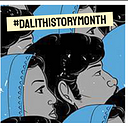Punnika’s Wisdom — Hear the Lion’s Roar
Today in #DalitHistory, we visit the story of an ancestor, Punnika. Somewhere between the 4th and 6th centuries B.C.E. in the city of Savatthi (modern-day Uttar Pradesh), Punnika was born of a slave. As children of slaves usually were, she was kept as a slave herself. Most days she worked doing domestic chores - cleaning, getting groceries from the market, processing crops, and carrying water.
During one of her trips to carry water, she had heard the Buddha discuss a sermon he had entitled “ The Lion’s Roar”. Within this sermon, the Buddha had detailed how a Buddhist disciple’s preaching can be likened to the roar of a lion because of how they preach the Law — “without any fear and refuting all erroneous doctrines”.
Having listened to this sermon, many thoughts begin to swirl around in Punnika’s mind. She begins to contemplate ideas of high and low in society and tried to make sense of her place within it.
One very early morning, she went out to carry water from a nearby water source when she encountered a Brahmin performing his daily ablutions. This man, Udakasuddhika, like other Brahmins, believed in the caste purification qualities of water. Watching him perform his ablutions, she remembers the Buddha’s Lion’s Roar speech and finds strange confidence swell up within her. She addresses the Brahmin directly. This conversation is recounted in the Therigatha Sutta (“Verses of the Elder Nuns”) as follows:
[Punnika:]
I’m a water-carrier, cold,
always going down to the water
from fear of my mistresses’ beatings,
harassed by their anger & words.
But you, Brahman,
what do you fear
that you’re always going down to the water
with shivering limbs, feeling great cold?
[Udakasuddhika:]
Punnika, surely you know.
You’re asking one doing skillful kamma
& warding off evil.
Whoever, young or old, does evil kamma
is, through water ablution,
from evil kamma set free.
[Punnika:]
Who taught you this
— the ignorant to the ignorant —
‘One, through water ablution,
is from evil kamma set free?’
In that case, they’d all go to heaven:
all the frogs, turtles,
serpents, crocodiles,
& anything else that lives in the water.
Sheep-butchers, pork-butchers,
fishermen, trappers,
thieves, executioners,
& any other evildoers,
would, through water ablution,
be from evil kamma set free.
If these rivers could carry off
the evil kamma you’ve done in the past,
they’d carry off your merit as well,
and then you’d be
completely left out.
Whatever it is that you fear,
that you’re always going down to the water,
don’t do it.
Don’t let the cold hurt your skin.”
[Udakasuddhika:]
I’ve been following the miserable path, good lady,
and now you’ve brought me
back to the noble.
I give you this robe for water-ablution.
[Punnika:]
Let the robe be yours. I don’t need it.
If you’re afraid of pain,
if you dislike pain,
then don’t do any evil kamma,
in open, in secret.
But if you do or will do
any evil kamma,
you’ll gain no freedom from pain,
even if you fly up & hurry away.
If you’re afraid of pain,
if you dislike pain,
go to the Awakened One for refuge,
go to the Dhamma & Sangha.
Take on the precepts:
That will lead to your liberation.
[Udakasuddhika:]
I go to the Awakened One for refuge;
I go to the Dhamma & Sangha.
I take on the precepts:
That will lead to my liberation.
Before, I was a kinsman to Brahma;
now, I am truly a brahman.
I’m a three-knowledge man.
consummate in knowledge,
safe & washed clean.
Punnika’s strong words, full of clarity of thought and wisdom convinced the Udakasuddhika to give up his Brahmanical practice and join the Buddhist order. On seeing that Punnika’s wisdom could even persuade a Brahmin, her master decided to give her freedom.
Punnika then went to the Buddha and asked to join the Buddhist sangha. She was soon ordained a bhikkuni (nun) and spent the rest of her life in Buddhist service.
Punnika’s story from this time illustrates a Brahmanical society in moral turmoil and how Buddhism worked within it to inspire courage among those considered to be the lowest among the low. Like Punnika, countless others must have also been galvanised to embrace and spread radical new ideas of Buddhist equity.
Sources
- https://www.nichirenlibrary.org/en/dic/Content/L/40
- Murcott, Susan. First Buddhist Women: Poems and Stories of Awakening. Parallax Press, 2002.
- Thig 12.1 PTS: Thig 236–251, Punnika: Punnika and the Brahman, translated from the Pali by Thanissaro Bhikkhu
